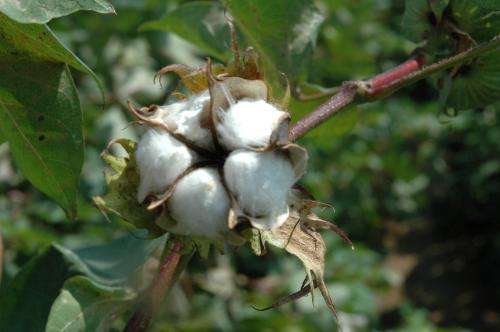September 13, 2016 report
New genetically modified variety of cotton disables sapsucking whiteflies

(Phys.org)—A team of researchers from a multitude of institutions in India has developed a genetically modified cotton variety that stunts the growth of sapsucking whiteflies, reducing their negative impact on crop yields. In their paper published in the journal Nature Biotechnology, the researchers describe the approach the team took in developing a means for controlling crop damage due to the pests.
Scientists have made great strides in controlling insects that feed on plant leaves, helping to greatly improve crop yields across the globe—unfortunately, the same cannot be said for controlling insects that suck the sap out of plants, causing serious damage. One such insect, the whitefly, attacks a variety of plants. Both adults and nymphs harm crop plants by sucking the juices that sustain new growth causing stunting, yellowed leaves and lower yields—anyone who gardens has seen them. They congregate on the undersides of leaves and rise as a cloud when disturbed. In this new effort, the researchers sought to lessen the damage they cause to cotton plants by adding proteins to them that other plants use to successfully ward them off.
The team began by looking at ferns which are known to be nearly immune to attack by whiteflies. They found that the protein responsible for providing such protection was Tectaria macrodonta, which they promptly shortened to Tma12. Next, they genetically modified a group of cotton plants causing them to produce the protein. They inserted the genes into 87 genetic locations of which just 16 plants grew to maturity—of those, just nine produced a reasonable amount of the desired protein. The researchers found that the whiteflies who fed on the modified plants experienced abnormal development similar to those that fed on the original ferns and very few lasted long as adults. They also found that the modified plants did not cause problems for other insects, which meant they appeared to be safe for use in the wild. To find out if the same would be true for humans exposed to the cotton from the plants, the researchers fed it to test rats and report that it caused no ill effects and was in fact undetectable.
Other groups will have to test the new cotton before it can be sold to farmers, of course, but at this point, the researchers are confident that they have finally found a way to combat whiteflies.
More information: Anoop Kumar Shukla et al. Expression of an insecticidal fern protein in cotton protects against whitefly, Nature Biotechnology (2016). DOI: 10.1038/nbt.3665
Abstract
Whitefly (Bemisia tabaci) damages field crops by sucking sap and transmitting viral diseases. None of the insecticidal proteins used in genetically modified (GM) crop plants to date are effective against whitefly. We report the identification of a protein (Tma12) from an edible fern, Tectaria macrodonta (Fee) C. Chr., that is insecticidal to whitefly (median lethal concentration = 1.49 μg/ml in in vitro feeding assays) and interferes with its life cycle at sublethal doses. Transgenic cotton lines that express Tma12 at ~0.01% of total soluble leaf protein were resistant to whitefly infestation in contained field trials, with no detectable yield penalty. The transgenic cotton lines were also protected from whitefly-borne cotton leaf curl viral disease. Rats fed Tma12 showed no detectable histological or biochemical changes, and this, together with the predicted absence of allergenic domains in Tma12, indicates that Tma12 might be well suited for deployment in GM crops to control whitefly and the viruses it carries.
Journal information: Nature Biotechnology
© 2016 Phys.org




















